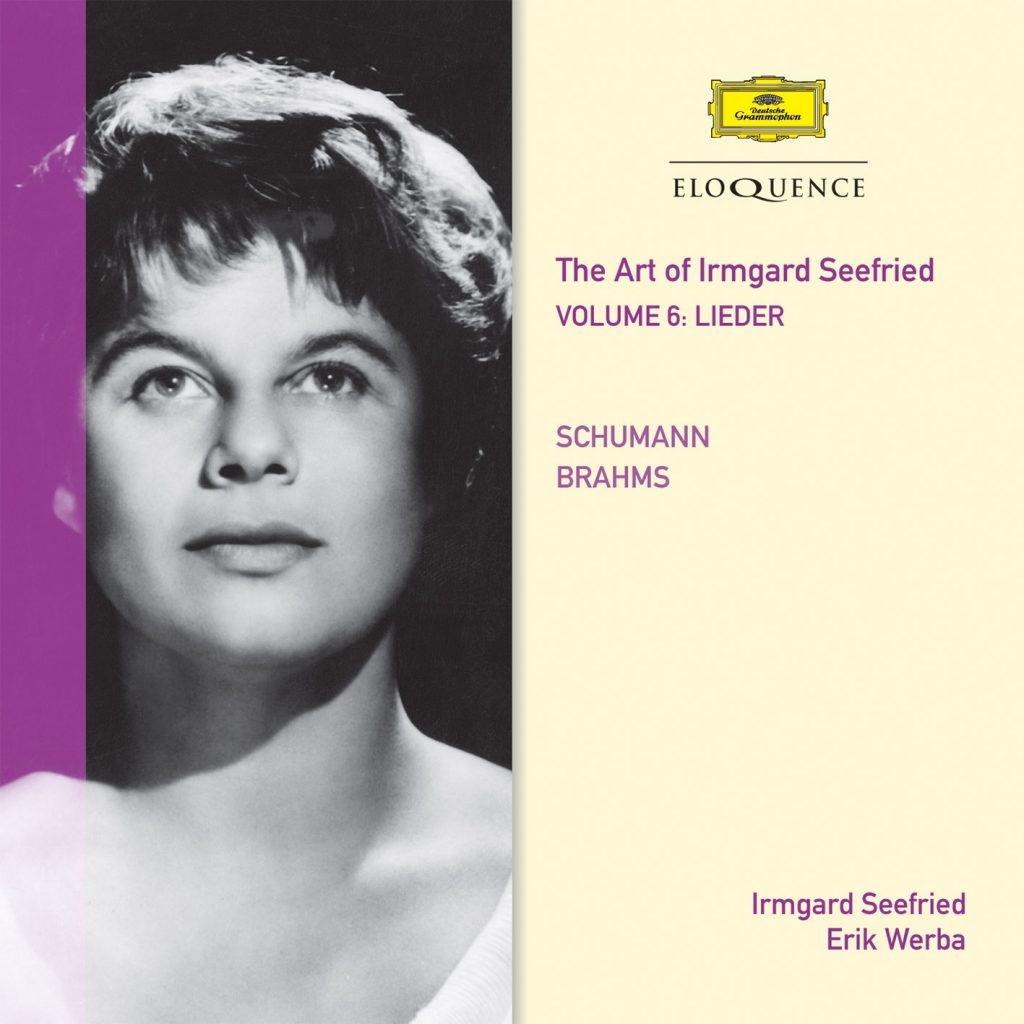‘If I were condemned to hear only one voice for the remainder of my life I think it might well be hers. If I wanted to be charmed, to laugh or cry I would find her the perfect companion. In her singing … we hear someone whose every utterance bespeaks natural sincerity and truthful feeling’
ALAN BLYTH on IRMGARD SEEFRIED (Gramophone)
After Irmgard Seefried’s death in 1988, her contemporary, Elisabeth Schwarzkopf – never one to dish out compliments lightly – commented: ‘All of us envied her, because what we had to achieve laboriously, worked for her so naturally and as a matter of course, because she knew how to sing from the heart’.
Freshness, spontaneity, natural warmth of feeling, allied to a voice of gleaming beauty and a delightful stage presence: these were the hallmarks of a much-loved soprano who for three decades charmed and moved audiences in the theatre and concert hall, her face as expressive as her voice. As John Steane memorably put it in Gramophone, ‘it was as though she wore her own spotlight’.
Born in the Swabian town of Köngetried in 1919, Seefried was ‘discovered’, aged twenty, by Herbert von Karajan in Aachen, where she made her operatic debut as the Priestess in ‘Aida’. In 1943, she sang Eva in ‘Die Meistersinger’ for the Wiener Staatsoper, initiating an association that lasted until 1976. It was in Strauss and Mozart that Seefried was most admired.
Issued over eleven single-disc volumes, Deutsche Grammophon/Eloquence pays tribute to Irmgard Seefried, bringing back to circulation several recordings that have never previously been issued on CD. The music ranges through opera and oratorio, with an especially generous offering of art song from a range of composers, including Schubert, Schumann, Wolf, Hindemith and Egk. The notes for the series have been written by that leading connoisseur of the voice, Richard Wigmore.
Seefried’s expressive directness and unselfconscious charm also made her a cherishable recitalist, usually in partnership with the Viennese pianist Erik Werba (1918–1992). Together they performed and recorded an enterprisingly wide swathe of Lieder from Mozart to Hindemith. In these 1956 Schumann recordings they focused on settings of Heinrich Heine, the poet with whom the composer had the most intuitive sympathy.
Seefried often included a handful of Brahms folksong arrangements in her recitals, allowing her, inter alia, to slip into the dialect of her native Swabia. Her naturalness and gift of singing ‘from the heart’ made her an ideal interpreter of these touching cameos. Elsewhere, the mezzo depths within Seefried’s vernal soprano are movingly heard in the Tristanesque death-longing of ‘Der Tod, das ist die kühle Nacht’, and the crepuscular ‘Die Mainacht’. She brings an inexorably mounting passion to ‘Nicht mehr zu dir zu gehen’ and uninhibitedly relishes the fervid vision of erotic bliss in ‘Unbewegte laue Luft’. Seefried crowns her Brahms group with a tender, intensely felt performance of the famous ‘Von ewiger Liebe’, perhaps the most piercing declaration of undying love in all song.
ROBERT SCHUMANN
Die Lotosblume, Op. 25 No. 7
Was will die einsame Träne, Op. 25 No. 21
Du bist wie eine Blume, Op. 25 No. 24
Der arme Peter, Op. 53 No. 3
Dein Angesicht, Op. 127 No. 2
Anfangs wollt’ ich fast verzagen, Op. 24 No. 8
Tragödie II (Es fiel ein Reif)*
Tragödie III (Auf ihrem Grab)* (with Oskar Werner, speaker)
Mit Myrten und Rosen, Op. 24 No. 9
JOHANNES BRAHMS
Die Trauernde, Op. 7 No. 5
Die Schwälble ziehet fort, Op. 7 No. 4
Deutsche Volkslieder
Feinsliebchen
Schwesterlein
In stiller Nacht
Vergebliches Ständchen, Op. 84 No. 4
Wir wandelten, wir zwei zusammen, Op. 96 No. 2*
Nicht mehr zu dir zu gehen, Op. 32 No. 2*
Ruhe, Süssliebchen, Op. 33 No. 9*
Die Mainacht, Op. 43 No. 2*
Der Tod, das ist die kühle Nacht, Op. 96 No. 1*
Unbewegte laue Luft, Op. 57 No. 8*
Ständchen, Op. 106 No. 1*
Vergebliches Ständchen, Op. 84 No. 4*
Von ewiger Liebe, Op. 43 No. 1*
Irmgard Seefried, soprano
Erik Werba, piano
* FIRST RELEASE ON CD
Recording Producers: Gisa von Gleis (1–11); Dr. Fred Hamel (12–17); Hans Ritter (18–26)
Recording Engineers: Alfred Steinke (1–11); Heinrich Keilholz (12–17); Heinz Wildhagen (18–26)
Recording Locations: Robert-Schumann-Saal, Düsseldorf, Germany, 10–11 April 1956 (1–11); Mozart-Saal, Konzerthaus, Vienna, Austria, 12 September 1952 (12–17); Brahms-Saal, Musikverein, Vienna, Austria, 9–13 June 1958 (18–26)
Compilation: Alan Newcombe
Mastering: Lennart Jeschke (Studioexport)
‘Miss Seefried’s contributions are extremely beautiful; she sings in ravishing tones, and with fullness of voice … the recording is very real’ (Schumann) Gramophone




